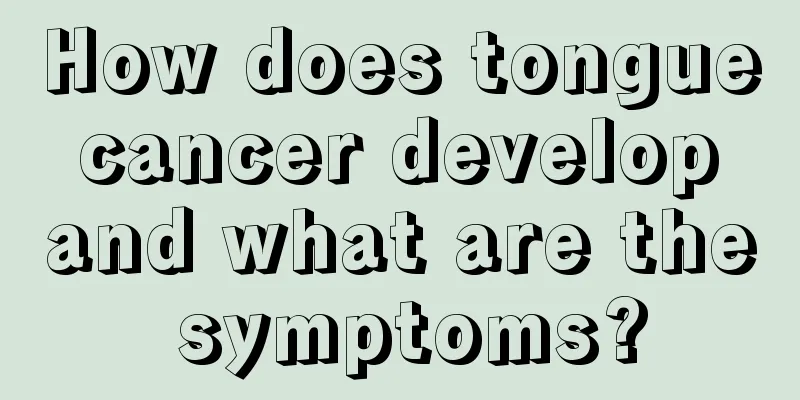How does tongue cancer develop and what are the symptoms?

|
The formation of tongue cancer is closely related to genetics, oral environment, physical health and bad habits. Its main symptoms include tongue ulcers that do not heal, foreign body sensation on the tongue, pain or limited mobility. If you find related symptoms, you should seek medical attention as soon as possible. This article will analyze the causes of tongue cancer in depth and list the early symptoms and suggestions. 1. Causes of tongue cancer 1. Genetic factors If someone in your family has cancer, especially head and neck malignancies, your risk of developing tongue cancer will increase. This may be related to gene mutations in the family or individual genetic susceptibility. 2. Environmental factors (external stimuli) Long-term smoking, drinking or chewing betel nut are high-risk behaviors that induce tongue cancer. Harmful substances in tobacco and alcohol can directly irritate the tongue mucosa, leading to abnormal cell proliferation. Long-term consumption of hot or spicy food may also increase damage to tongue tissue, thereby increasing the risk of cancer. 3. Physiological factors (one’s own health condition) Chronic inflammation of the tongue, leukoplakia or lichen planus, if not treated in time, may deteriorate into tongue cancer. In particular, poor oral hygiene or low immunity can also aggravate the progression of these lesions. 4. Trauma (long-term local irritation) Long-term friction from ill-fitting dentures, sharp teeth or dental restorations may cause repeated trauma to the tongue mucosa, which may induce cancer over time. 5. Viral infection (pathological cause) Human papillomavirus (HPV) infection may be related to the occurrence of tongue cancer, especially HPV types 16 and 18. These high-risk viruses may cause cancerous changes in tongue cells. 2. The main symptoms of tongue cancer 1. Tongue ulcers that do not heal after long-term treatment In the early stages of tongue cancer, abnormal ulcers are often seen on the tongue, which are usually rough in surface, with irregular borders and a tendency to bleed. If there is no improvement after taking medication, you should be highly alert. 2. Pain and foreign body sensation Some patients may feel a foreign body sensation on their tongue or in their mouth, which then gradually develops into tingling or constant pain when eating or talking. This pain may sometimes radiate to the ears or jaws, which is an important warning sign. 3. Limited tongue movement Patients with tongue cancer may experience tongue stiffness or limited movement, which may affect normal swallowing, pronunciation or chewing functions in severe cases. Local swelling and numbness of the tongue are also common manifestations. 4. Tongue lumps A lump or bump with an unusual texture may appear on the tongue, which is noticeably different from the surrounding normal tissue. This lump may increase in size as the cancer develops. 3. Measures to deal with tongue cancer 1. Surgery In the early stage of tongue cancer, tongue tumor resection is often performed, and the prognosis is better for localized tongue cancer. In the advanced stage, partial tongue resection or neck lymph node dissection may be required, and the surgery depends on the size of the tumor and the extent of invasion. 2. Radiation therapy It is suitable for local lesions of tongue cancer. Radiotherapy can be used as the main or auxiliary treatment for patients who are not suitable for surgery or have residual cancer cells after surgery. 3. Chemotherapy Chemotherapy is often used for patients with advanced tongue cancer, especially when the cancer has metastasized. Combining drugs such as cisplatin and fluorouracil may improve treatment outcomes. 4. Diet and lifestyle management Balanced nutrition, quitting smoking and limiting alcohol consumption, and avoiding irritating foods are important measures to prevent the recurrence of tongue cancer. Attention should be paid to oral hygiene and regular checkups should be performed to increase the probability of early detection. Discovering the causes and symptoms of tongue cancer can significantly increase the early screening rate and help with timely intervention. If abnormal tongue ulcers or other symptoms occur, you should consult a dentist or oncologist as soon as possible to get the best treatment opportunity and ensure the effect. |
<<: Is the cure rate of stage t2 prostate cancer high?
>>: What to do with breast fibroids in an 18-year-old girl
Recommend
What is the best way to care for hamartoma
What is the best way to care for hamartoma? Hamar...
What are the effects of Jieyu Anshen Capsules
Nowadays, as the pressure of life becomes greater...
What are the ways to prevent lung cancer? 5 effective tips for preventing lung cancer
Lung cancer has the highest mortality rate among ...
The harm of electromagnetic fields to human body
Workers in many factories need to be in electroma...
How often should the frying oil be changed
Fried foods are usually very popular in life. Man...
What are the early symptoms of lung cancer? 7 common symptoms of early lung cancer
Since the early symptoms of lung cancer are relat...
What causes cold feet in winter?
Many of my friends have cold feet even after slee...
What should I do if my teeth keep bleeding when brushing?
In our daily lives, more and more people are suff...
What to do if your shoes pinch your toes
Some people may get their toes pinched by their s...
How to get rid of garlic smell on hands
In daily life, people sometimes use garlic when m...
What happens if there is a little blood in the vaginal discharge?
Women's physical health is very important, an...
Running heart rate 180
When running, everyone will obviously feel that t...
Does appendicitis in children require surgery?
In contemporary society, appendicitis affects a w...
What are the symptoms of Still's disease?
Still's disease is actually a type of arthrit...
Which disinfectant is better for hand, foot and mouth disease?
Hand, foot and mouth disease is a common disease ...









